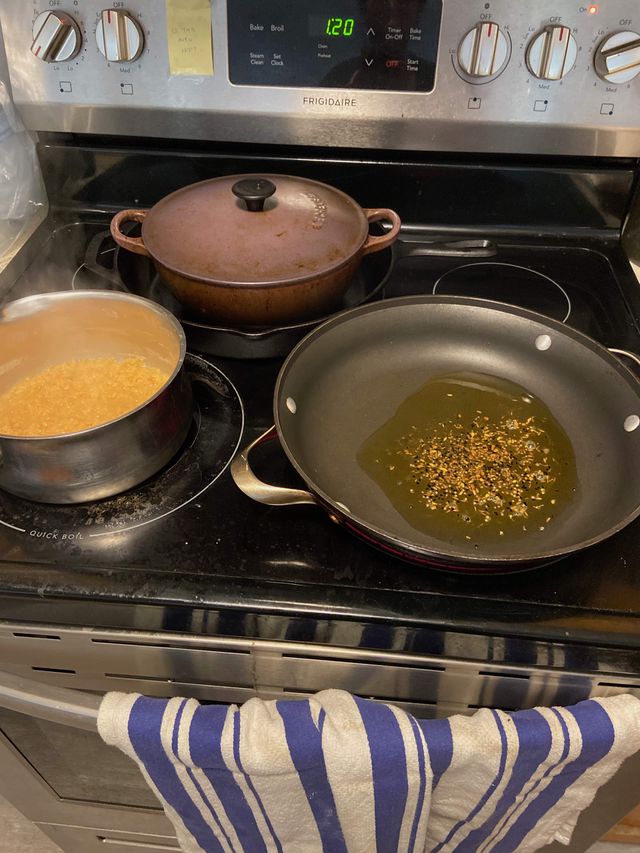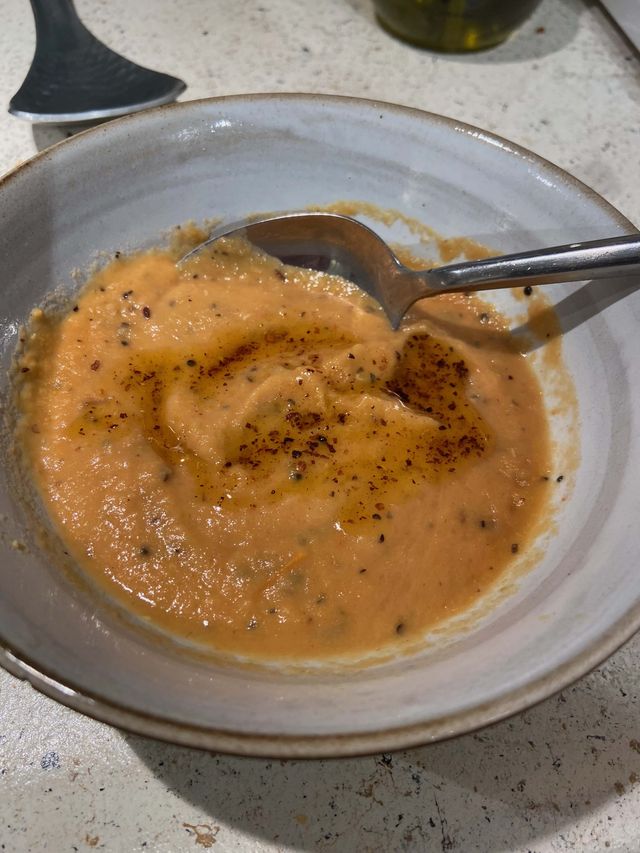Masoor dal (red lentils) is a great test app for cooking
I put a lot of intentional time into learning cooking during the pandemic. To be completely frank, I've never cooked much at all in my life, getting by mostly with frozen meals and cost-effective takeout like tacos (a blessing of living in California.) So this was a significant change for me.
A lot of folks have talked about the parallels between cooking and programming. (Aside: I think it's not shocking that Ink and Switch's recent research prototype Potluck uses cooking and recipes as the domain to explore dynamic documents as personal software.) They are activities that can be done solo, in general, with relatively quick feedback loops, plenty of tacit knowledge, and levels of abstraction that can be achieved and transferred across different instances of problems or aims.
Having acquired a number of cooking books during this effort, two really stuck with me as the most valuable:
-
Salt Fat Acid Heat by Samin Nosrat - This is the highly predictable guess.
-
Masala Lab: The Science of Indian Cooking by Krish Ashok - This is the less predictable and standout book for me! While focused on Indian cooking's methods, it generalizes and goes into the science quite well. What's more, Ashok explicitly takes an algorithmic approach, describing for example a general-purpose algorithm for composing Indian gravies (dba "curries" in many corners) with different variables to tinker with to yield different flavor profiles that evoke the cuisines of different regions.
What both books have in common is a focus less on specific recipes, and more on patterns and abstractions that are useful across dishes.
But to actually use any of these patterns and abstractions, you actually need a concrete context, and that generally means applying the ideas to generate a dish that does not suck. For an amateur, I'll confess I think that's easier said than done!
Masoor dal: a kind learning environment
Remember TodoMVC? It's a site that shows how to implement a small todo app in a variety of Javascript frameworks. The point is to illustrate the different tools, how they work, how you use them, all with a sufficiently compact problem domain that your attention goes less to that problem and more to the details of each framework.

Masoor dal - red lentils - has been a wonderful "test app" for me. It's relatively easy, very fast (20-30 mins?), exceedingly cheap (reducing downside risk cost of a failed attempt), and maybe most importantly it is an excellent medium for trying many different flavors and micro-methods involved in cooking.
Put another way, masoor dal has represented a "kind learning environment" for cooking. This concept comes from psychology which differentiates between kind and wicked learning environments, which can also be read as feedback loop environments. I first learned of the concept from David Epstein's Range: Why Generalists Triumph in a Specialized World.
To quote from that book:
[In] 'kind' learning environments. Patterns repeat over and over, and feedback is extremely accurate and usually very rapid. In golf or chess, a ball or piece is moved according to rules and within defined boundaries, a consequence is quickly apparent, and similar challenges occur repeatedly.
In 'wicked' domains, the rules of the game are often unclear or incomplete, there may or may not be repetitive patterns and they may not be obvious, and feedback is often delayed, inaccurate, or both. In the most devilishly wicked learning environments, experience will reinforce the exact wrong lessons. [1]
Making masoor dal has let me quickly do something, and see how it works (or doesn't.)

(Careful observers may note the post-it reading Is the oven off? affixed to the stove face. As they say: service design is my passion - aaand I keep leaving the oven on.)
Some examples of the micro-skills I spend more of my attention on when making it over and over:
- Understanding "when the oil shimmers" as a signal of sufficient heat to add whole spices like cumin
- Figuring out what onions being cooked to some "golden" and vaguely transparent level really means
- Smelling garlic or ginger (or other spices) cooking in oil and learning what "when the spices are aromatic" actually means experientially
- Chopping onions (yes! chopping onions well is not something humans leave the womb fully-formed in capability on! and what's more this task drives me to a yak shave - getting a proper chef's knife, which I now use for virtually everything and on the order of 10-30 times per day)
- Cooking down fresh tomatoes (and the relative differences of using canned tomatoes - which are great too for this!)
- The significant effect of a tiny amount of turmeric on a tomato and onion flavor profile

And by far the most important of all!
- How to balance a dish with the incremental addition of salt and acid (fresh lemon juice is my ride-or-die companion in the kitchen these days)
I can hardly describe the revelatory power of tasting a batch fresh off the stove, squeezing some lemon juice, and then finding the dish to be a completely different and wonderful flavor.

My own favorite masoor dal: a Bengali flavor
After much experimentation, my favorite masoor dal to cook these days is a Bengai-flavor-inspired riff using the ideas in Masala Lab.
It is... very, very good. Oh did I mention dal is fairly healthy?
This recipe is an excellent proxy, though I make the following specific changes:
- It is a must to use mustard seed oil here
- I use 1 serrano pepper specifically for more (and "clean" i.e. unflavored) heat
- I use 1 medium white onion
- I use roma tomatoes, but occasionally use a canned tomatoes, and I'm still undecided which I prefer (canned is perhaps slightly leading for me right now)
I live in the US, and as such there are two ingredients that may be slightly harder to find, and so recommend visiting an Indian grocery or ordering from online (Amazon has both) - these are:
- Mustard seed oil
- Panch phoron spice mix (a mix of 5 whole spices, so if you happen to be a spice nut already, and you have cumin, fenugreek, brown mustard seeds, fennel and nigella seeds on hand, you're good to go)
[1] Source of these quotes is the book, but are pulled from https://www.driverlesscrocodile.com/books-and-recommendations/more-from-david-epstein-on-kind-and-wicked-learning-environments/
You can subscribe to new posts from me by email (Substack) or RSS feed.